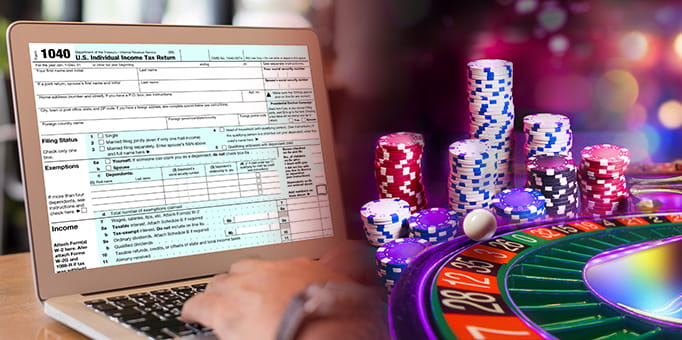Paying Taxes on Gambling Winnings
While all states require individuals to pay taxes on gambling winnings, these rules will vary depending on where you are located. Whether you’re a casual or professional gambler, knowing these rules is essential so you don’t risk any serious penalties. Throughout this guide, you’ll learn all you need to know about this topic.

It’s not just the taxes on casino winnings you’ll need to consider. There are several online gambling taxes that are applied to everything from sports betting to DFS. For this reason, we’ve started this guide by looking at the intricacies of gambling taxation on a federal and state level.
We’ve then broken down the basic tax rates for gambling for each state before covering what you need to do to pay your gambling taxes. We’ve then discussed whether you can claim tax deductions from gambling losses before explaining whether there are any penalties for not reporting your winnings to the IRS.
- About Taxes on Casino Winnings
- Casino Taxes by State
- How to Pay Your Gambling Taxes
- Tax Deductions
- Penalties for Not Reporting Winnings
About Taxes on Casino Winnings
Unlike many other countries around the world, gamblers in the USA must pay taxes on casino winnings. However, there are some exceptions to this rule. Each gambling activity has a different minimum threshold for winnings to be reported to the IRS. Once this is exceeded a 24% tax rate is applied.
In most cases, a casino will automatically deduct this amount from your winnings when you cash out and you won’t need to worry about it. In addition to this, casinos pay varying tax rates depending on the location of the state, If you’re a professional gambler, it’s also possible to claim a gambling losses tax deduction.
Federal Tax Minimums
The minimum threshold differs from activity to activity. For example, if you win less than $1,200 on slots or bingo, you won’t need to pay taxes. The minimum threshold is $1,500 and under for keno, and $5,000 and under for sweepstakes, poker, and lotteries. For sports betting, the taxation threshold is $600 or more.
Casino Taxes by State
As we’ve mentioned, each state will have varying tax rates applied to casino and sports betting revenues. For example, taxes on sports betting in NJ differ from those in Pennsylvania or Michigan. We’ve covered the casino taxes by state in the following table.
Please note that we have only included states where both sports betting and casino gambling is legal:
| State | Casino Revenues Tax Rate | Sports Betting Revenues Tax Rate |
|---|---|---|
| Arkansas | 13- 20% | 13-20% |
| Colorado | Up to 20% | 10% |
| Delaware | 57% slots, 20% table games | 50% |
| Florida | 35% on slots | |
| Illinois | 15-50% | 15% |
| Indiana | 15-40% for riverboats, 25-35% for racinos | 9.5% |
| Iowa | 5-22% for commercial casinos, 22-24% for racinos | 6.75% |
| Kansas | 27% | 5.5% |
| Louisiana | Riverboats and commercial casinos 21.5%, racinos 36% | 10% |
| Maine | 39-46% slots, 16% on table games | 10% |
| Maryland | 40-61% slots, 20% table games | 15% |
| Massachusetts | 25% | 15% |
| Michigan | 19% | 8.4% |
| Mississippi | 4-8% | 12% |
| Missouri | 21% | – |
| Nebraska | 20% | – |
| Nevada | 2.5-6.75% | 6.75% |
| New Jersey | 9.25% | 8.5% |
| New Mexico | 46.25% | Varies |
| New York | 47-45% slots, 10% table games | 10% |
| Ohio | 33-33.5% | 10% |
| Oklahoma | 35-50% | – |
| Pennsylvania | 55% slots, 16% table games | 36% |
| Rhode Island | 68.85%-74% slots, 19-19% table games | 51% |
| South Dakota | 9% | 9% |
| West Virginia | 53.5% slots, 35% table games | 10% |
It’s worth noting that the above tax rates will not concern individuals at all. Instead, these rates are applied to casino revenues, with operators having to pay these to the local government. However, higher rates can have an impact on the payout rates of games and the affordability of casino visits.
In some states, you will be required to claim the winnings in their state. You may be charged taxes by these states for these winnings, even if you’re not a resident. You will need to report these winnings when you do your local tax return, though you will receive a deduction on this income if it’s already paid to the non-resident state.
How to Pay Your Gambling Taxes
When you’ve won over the threshold, the operator is required to issue you a Form W-2G. This is evidence that you have won and that the tax has automatically been deducted. For winnings that haven’t been deducted, you must report the gambling income in the “Other Income” section of your tax return.
The flat rate for taxes on gambling winnings is set at 24% initially. However, you may get reimbursed some or have to pay more depending on which tax bracket you are in. If you’re a professional gambler, you will need to report your gambling winnings as regular income and you’ll be taxed according to your tax bracket.
Non-residents of the USA must also report gambling winnings using Form 1040NR. This will be taxed at a flat rate of 30%. However, only Canadian citizens may deduct their US gambling losses.
Gambling Losses Tax Deduction
The IRS permits individuals from claiming losses every year. However, your gambling losses can not exceed what you have won. For example, if you have won $10,000 but have lost $12,000, you can only claim $10,000 back as losses. The remaining $2,000 can not be written off.
This means that if you’ve only lost from gambling in a year, you will not be able to reduce your total tax bill. You will need to have won money to be able to claim anything back. Your gambling losses must be included on the Schedule A form and be itemized, meaning your winnings will be declared before the itemized deduction is considered.
Penalties for Not Reporting Winnings
It’s never worth actively failing to report your gambling winnings on your annual tax return. This is considered a violation of the law amounting to tax evasion. The IRS may discover this by comparing the W-2G forms and your income. They then will contact you asking for an explanation and may incur a small fine.
If this is a repeated offense or a large sum of money, you may receive a 20% fine of your total under-reported amount or $5,000, whichever is larger. In extreme cases, the IRS can pursue criminal charges and offenders may receive jail time of up to five years. Avoid the penalties for not reporting gambling winnings and lodge them on your return.
Conclusion
Now that we’ve concludes this guide on taxes on gambling winnings, you should be comfortable to lodge your winnings come tax time. Fortunately, top online gambling sites will automatically deduct taxes from your winnings if they exceed the minimum threshold. However, it’s essential to keep the W-2G form as you may be able to claim some of this back.
Essentially, your gambling winnings will be considered income and taxed accordingly. It is worth noting that some states may apply extra taxes on your gambling winnings. You will be prompted to report these when you lodge your state taxes. And remember, avoid penalties by always reporting your winnings.
Frequently Asked Questions
If you are looking for brief answers to your questions about gambling taxes, read the following section. Below, we’ve answered common queries about this important topic for those who don’t want to read the whole page. For more detailed answers, you can click on the links to jump up to each relevant section.
1. Do I have to pay taxes on my casino winnings?
Yes, you will have to pay casino taxes on your winnings if they exceed certain limits. These will change depending on the activity you have won from. Slots winnings are only taxed from $1,200, while poker and lotteries are taxed when winnings exceed $5,000. The flat federal tax rate on gambling winnings is 24%.
2. Are there different taxes for casino winnings in each state?
Yes, there are different state taxes on casino winnings in many states. However, not all states apply additional taxes. You will need to check this in your own state come tax time. It’s also important to note that each state applies different taxes on the casino’s total revenues. While you won’t need to worry about this, it can affect the overall price of a casino visit.
3. How do I pay taxes on casino winnings?
It is easy to pay your taxes on gambling winnings. If you win at a casino, your winnings will be deducted and you’ll be given a W-2G form. This is proof that you have paid taxes on these winnings and you’ll need to present these when you lodge your taxes. You can also include gambling winnings in the “Other Income” section of your tax form. Professional gamblers can report these winnings as regular income.
4. Can I claim my gambling losses as a tax deduction?
A gambling loss tax deduction is somewhat possible, though you won’t be able to receive the whole amount if your losses exceed your winnings. Instead, the tax deduction will be your losses minus your winnings. If you haven’t won at all, you won’t be able to deduct anything. You must list your losses in the itemized Schedule A section of your tax form.
5. What are the penalties for failing to declare my casino winnings?
There can be serious penalties for failing to declare your casino winnings. The IRS can find out if you’ve lied about this by comparing your income with their W-2G records. The penalties vary and may include a fine of up to $5,000 for smaller offenses. For larger offenses, you could be criminally charged with tax evasion and receive a prison sentence of up to five years.
 By Todd Winkler,
By Todd Winkler, What are the Biggest Examples of Sports Superstitions?
What are the Biggest Examples of Sports Superstitions? What are the Weirdest Olympic Sports?
What are the Weirdest Olympic Sports? Exploring the History of Native American Casinos: A Detailed Guide
Exploring the History of Native American Casinos: A Detailed Guide Best WNBA Players of All Time and Now
Best WNBA Players of All Time and Now States Where Online Gambling is Illegal and the Reasons Why
States Where Online Gambling is Illegal and the Reasons Why Ranking of All-Time Biggest Lottery Winners
Ranking of All-Time Biggest Lottery Winners Top 15 Casino Movies on Netflix Streaming Right Now
Top 15 Casino Movies on Netflix Streaming Right Now All You Need to Know About the NCAA Tournament 2023
All You Need to Know About the NCAA Tournament 2023 10 Niche sports you can bet on in the US
10 Niche sports you can bet on in the US The Best NFL Team Ever
The Best NFL Team Ever